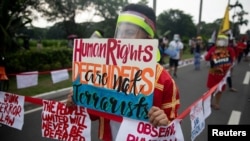The head of the United Nations is urging the world to put human rights “front and center” in the coronavirus recovery efforts in order to achieve a better future for its citizens.
In a televised address issued Thursday on the annual observance of International Human Rights Day, Secretary-General Antonio Guterres said the COVID-19 pandemic has had a “disproportionate impact on vulnerable groups” including frontline workers, the elderly, disabled, women and girls, and minorities.
The virus “has thrived because poverty, inequality, discrimination, the destruction of our natural environment and other human rights failures, have created enormous fragilities in our societies,” Guterres said, while simultaneously providing leaders with a pretext to impose “heavy-handed security responses and repressive measures that curtail civic space and media freedom.”
In a speech delivered Wednesday in Geneva, U.N. human rights commissioner Michelle Bachelet said the failure of many countries to take the virus seriously and to act quickly enough to prevent its spread has undermined a range of human rights issues around the world, including economic, civil and political rights.
“Politicizing a pandemic in this way is beyond irresponsible – it is utterly reprehensible,” Bachelet said. “Scientific evidence and processes have been discounted, and conspiracy theories and disinformation have been sown and allowed – or encouraged – to thrive.”
The ex-Chilean president said these actions have allowed discrimination, systemic racism and marginalization of the most vulnerable people in the world to flourish, especially in “countries in conflict” such as Yemen, which has suffered from “a perfect storm of five years of conflict and violations, disease, blockades, and shortage of humanitarian funding.”
Although the world is on the cusp of at least one safe and effective COVID-19 vaccine, Bachelet said it will not prevent or cure the socio-economic ravages caused by the pandemic. She said the only thing that can accomplish that is the “vaccine of human rights,” whose core ingredients are embedded in the Universal Declaration of Human Rights, which was adopted by the U.N. General Assembly on December 10, 1948.
Globally, the pandemic has infected at least 68 million people and killed more than 1.5 million, according to Johns Hopkins University.






